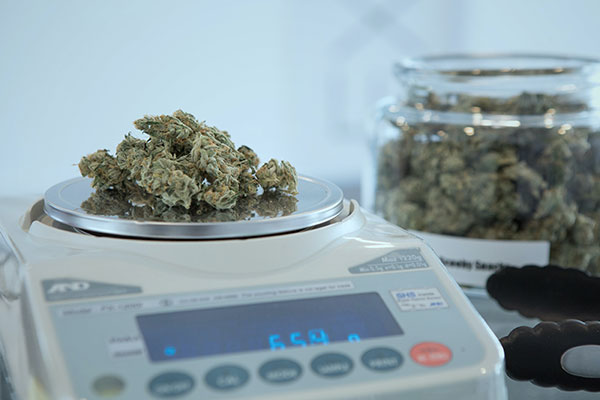Posted on
Last year, Connecticut legalized recreational marijuana use, and earlier this month began accepting applications for opening adult-use cannabis dispensaries. Retail shops are already widespread in other New England states including Massachusetts and Maine, and prove to be a lucrative venture with strong potential for growth. However, CT applicants must be prepared to answer for all aspects of their business—including how they will meet stringent security requirements.

 The ideal security plan for cannabis dispensaries should outline how your facility will remain compliant with Connecticut state regulations, how you will keep staff and customers safe, and how you will prevent theft or loss of your product. Your plan should make note of the security equipment you’ll be using, where all devices will be located, and how these systems will be maintained and backed up.
The ideal security plan for cannabis dispensaries should outline how your facility will remain compliant with Connecticut state regulations, how you will keep staff and customers safe, and how you will prevent theft or loss of your product. Your plan should make note of the security equipment you’ll be using, where all devices will be located, and how these systems will be maintained and backed up.
Let’s take a look at some of the minimum guidelines for dispensary security systems as set forth by the State of Connecticut. As you read these criteria, remember that the government knows that a security system of this magnitude is not a DIY job. That’s why you’ll need to establish a relationship with a security company before submitting your application, and wherever possible, make a note of your security company’s experience in the cannabis industry as well as their expertise with these technologies.
Video Surveillance Systems
If you already have a facility secured, begin with a floorplan of it, and label entrances and exits, areas where cannabis will be stored or sold, and other sensitive areas such as safes and vaults. All of these spaces will need to be recorded by your video surveillance cameras at all times—that’s 24 hours a day, 7 days a week. For low lighting, your cameras will also need to be equipped with night vision. All cameras must be angled so that anyone entering or exiting these areas can be clearly identified, and all footage must be kept for at least thirty days.
Ultimately, at the state’s request, you must be able to produce image captures from your video recordings. These must be full-color, high-quality (minimum 9600 dpi) images, with the date and timestamp. To this end, dispensaries will require a network of powerful video cameras with robust storage capacity.
Alarm Systems
A cannabis dispensary security plan should include no fewer than five alarm components:
- A perimeter alarm
- A duress alarm
- A panic alarm
- A holdup alarm
- A backup alarm system
Each of these serves a unique purpose. Both the duress and holdup alarm systems are silent alarms, designed to protect your staff and customers. If an employee is forced to disarm the dispensary’s security system, they can enter a designated “duress” code. A holdup alarm is typically triggered by a discrete button in the event of a robbery. Either alarm will dispatch help immediately.
The perimeter and panic alarm systems, on the other hand, transmit audible alarms. The perimeter alarm will go off if an unauthorized person attempts to access the dispensary, whether it’s by forcing the door or breaking a window; this alarm also acts as a deterrent against theft and vandalism. A panic alarm is manually triggered, and used in situations where everyone in the facility should be alerted, such as in a fire or medical emergency.
Access Control Systems
Connecticut state regulations do not specifically call for an electronic access control system, but this would fulfil the security procedures guidelines related to keyholding—while making this part of your business much easier. Dispensaries are required to provide keys, passwords, or other means of access only to authorized employees, maintain a log of permissions, and immediately collect or deactivate those keys if an employee leaves or is terminated. A commercial access control system is a streamlined way to meet state requirements and oversee employee productivity. Work with your security company to determine which technologies will work best for you, and include those details in your security plan.
System Maintenance & Testing
Of course, even the most sophisticated security equipment does little good if the system is not being properly maintained. Connecticut regulations demand that cannabis dispensaries keep all equipment and video recordings in a secure area with restricted access, and that systems be tested at least twice per year. Your entire security system must remain up and running—even during a power outage.
For busy facility owners, regular equipment testing and service can easily get overlooked or pushed off the schedule, which is why it’s important to emphasize that you’ve established a long-term relationship with your security company.
Other Security Considerations for Cannabis Dispensaries
Finally, the government has the right to require additional security measures from your dispensary—they may even force you to employ security guards. This is more likely in areas with higher levels of criminal activity, so be sure to include an overview of the neighborhood in your security plan. Highlight the positives, which may include recent progress made and proximity to law enforcement posts. You should also describe the security features of your property, including current or planned fencing, walls, and perimeter lighting.
To ensure your Connecticut dispensary application process is as smooth and as successful as possible, reach out to ISG. We can offer an assessment of your current security systems and help you fill in any gaps.

 866.393.4474
866.393.4474